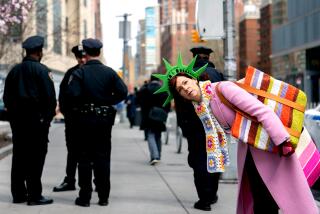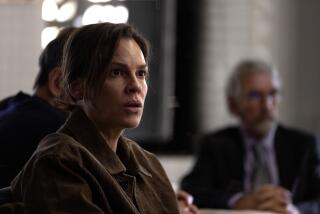MOVIE REVIEW : ‘THE GOOD WIFE’ GETS A BAD DEAL FROM EVERYONE
- Share via
It may be cultural slippage that keeps us from being able to connect with the sexual tensions running riot in “The Good Wife” (selected theaters), but I doubt it. We’ve been able to empathize with Madame Bovary and weep for Anna Karenina, and their surroundings seem hardly less exotic than the remote New South Wales lumber town that nurtured this good wife, Marge Hill.
It may also help to remember that this story happens pre-television--in 1939, when vocational gossip replaced soap opera, and when the beautiful Mrs. Hill’s headstrong romantic compulsions are enough to keep town snoops busy around the clock.
This still doesn’t answer a few hard questions. Can you fall in step emotionally with a movie in which a solid, but sexually maladroit Aussie lumberjack (Bryan Brown) hands his beloved wife (Rachel Ward) over to his younger brother (Steven Vidler) for the night--simply because his brother asks for her, and the wife remarks laconically that “one man’s the same as another”? Especially when that brother is so selfish and so immature we’re never quite sure he isn’t borderline retarded?
That’s only the beginning of the film’s peculiarities.
What makes “The Good Wife” so difficult for real lovers of (ahem) cinema is that the film has probably been given the most exquisite mounting you could hope for. In the cast is Ward, one of the half-dozen most piercingly beautiful women on screen, someone who projects intelligence in equal measure with her loveliness. There are also the estimable Brown, her real-life husband, as her devoted onscreen one, and Sam Neill ( pace “Amerika,” remember the previous body of work). The director is Ken Cameron, whose “Monkey Grip” was a subtle, gripping debut film. The camera work (James Bartle) and entire production are so stunning that you are an ally of the movie from its first five minutes.
But what do we do with this story?--an original screenplay by Peter Kenna, which turns on an adored but unfulfilled wife. When both her husband and brother-in-law prove equal duds in bed, she fixes on the town’s new publican. He is the smugly self-assured Neill, with whom Ward has had one glancing encounter (when she rebuffed his brazen proposition). Nevertheless, she sees Neill as the experienced lover who will, finally, end her sexual firestorm.
Actually, Neill probably could do just that, had he only sat down and had a few pints with her husband, and cared to have a little chalk-talk. Instead, Neill coldly spurns this beautiful woman, who has gone before our eyes from assured to desperate, and as her pursuit of him becomes a pathetic public scandal, the movie plummets from drama to melodrama.
What makes “The Good Wife” the oddity that it is, is that it remains compelling and, in the midst of all this psychological incomprehensibility, there are exceptionally good performances. (The film’s R-rating is for language and sexual situations.)
Ward seems to be balanced by some perfect inner gyroscope that allows her to survive the story’s silliness impeccably. Brown is both physical and touching as the strong, good husband who would give his wife anything in his power, if he only knew how (and what) to give. And Neill is hotly hateful as the womanizer whose speeches reveal the worm at the soul of a tireless Casanova.
But not even these performances--nor the film’s strong visual hints about lives shuttered-off from each other--are enough to let us cross over with it into this bizarre romantic no-man’s-land.
‘THE GOOD WIFE’
An Atlantic Entertainment Group presentation of a Laughing Kookaburra Production. Producer Jan Sharp. Director Ken Cameron. Original screenplay Peter Kenna. Camera James Bartle. Editor John Scott. Associate producer/production manager Helen Watts. Production design Sally Campbell. Production executive Michael Nolin. Music Cameron Allan. Costumes Jennie Tate. With Rachel Ward, Bryan Brown, Steven Vidler, Sam Neill, Jennifer Claire, Bruce Barry, Clarissa Kaye-Mason.
Running time: 1 hour, 37 minutes.
MPAA-rated: R (persons under 17 must be accompanied by parent or adult guardian)
More to Read
Only good movies
Get the Indie Focus newsletter, Mark Olsen's weekly guide to the world of cinema.
You may occasionally receive promotional content from the Los Angeles Times.








